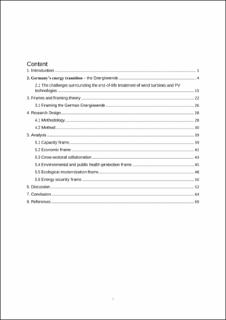Sammendrag
The topic of climate change mitigation has garnered increased attention from societal and political actors, resulting in the Paris Agreement or the European Green Deal. In the case of Germany, the Energiewende is central in the pursuit of the goal of a sustainable future, first and foremost the development and expansion of renewable sources for a clean energy supply by 2050. Yet, with the first generation of renewable energy technologies, specifically wind turbines and photovoltaic (PV) panels reaching their end-of-life (EoL), question concerning their waste management gaining rising importance. Thus, this thesis aims to explore the discussion surrounding the EoL management of wind power plants and solar systems by using frames theory to understand how the discussions are framed and by whom. The thesis assesses how the framing of EoL wind turbines is similar and differs from the of EoL PV panels and batteries to learn more about the perceptions and interest of various stakeholders involved in the conversation of these two renewable energy technologies as well as how they might influence the policy making process with framing.
The analysis finds several prominent frames used by actors from industry, politics and society for the management of EoL wind turbines and EoL solar systems. For EoL wind turbines the most significant are the capacity frame, cross-sectoral collaboration frame and economic frame whereas in the case of EoL PV panels and batteries the ecological modernization frame, environment and public health protection frame and energy security frame are commonly used by stakeholders engaged in the discussion. However, except for the energy security frame all five other frames are applied to EoL solar systems and EoL wind power plants, making them differ in what statements and arguments they frame rather than the frames itself. Hence, the real difference lies in the frame sponsors and their positions towards the given topic that they try to garner support for by using a specific frame. Most noticeable is participation or lack therefore on behalf of the German governments in the discussions regarding the EoL treatment of wind turbines and PV panels plus batteries, particularly in the case of wind turbines and how it leads to the retention of the status quo regarding policies and regulations concerning these renewable energy technologies and their waste management.
